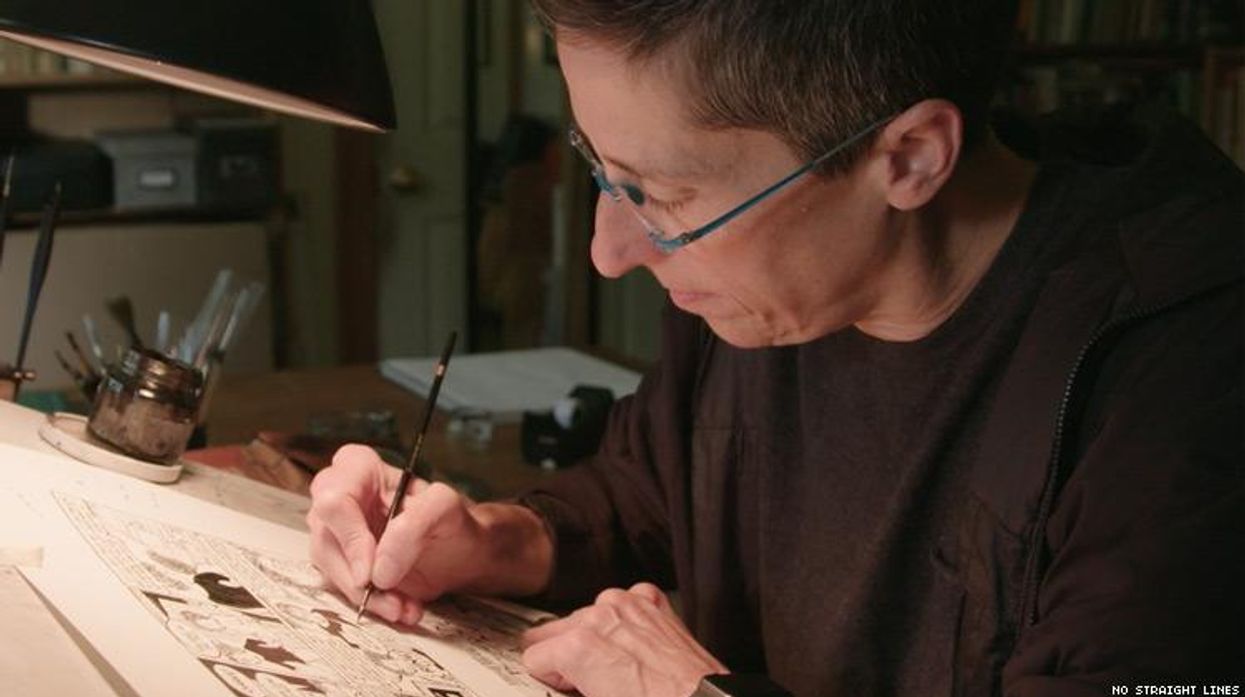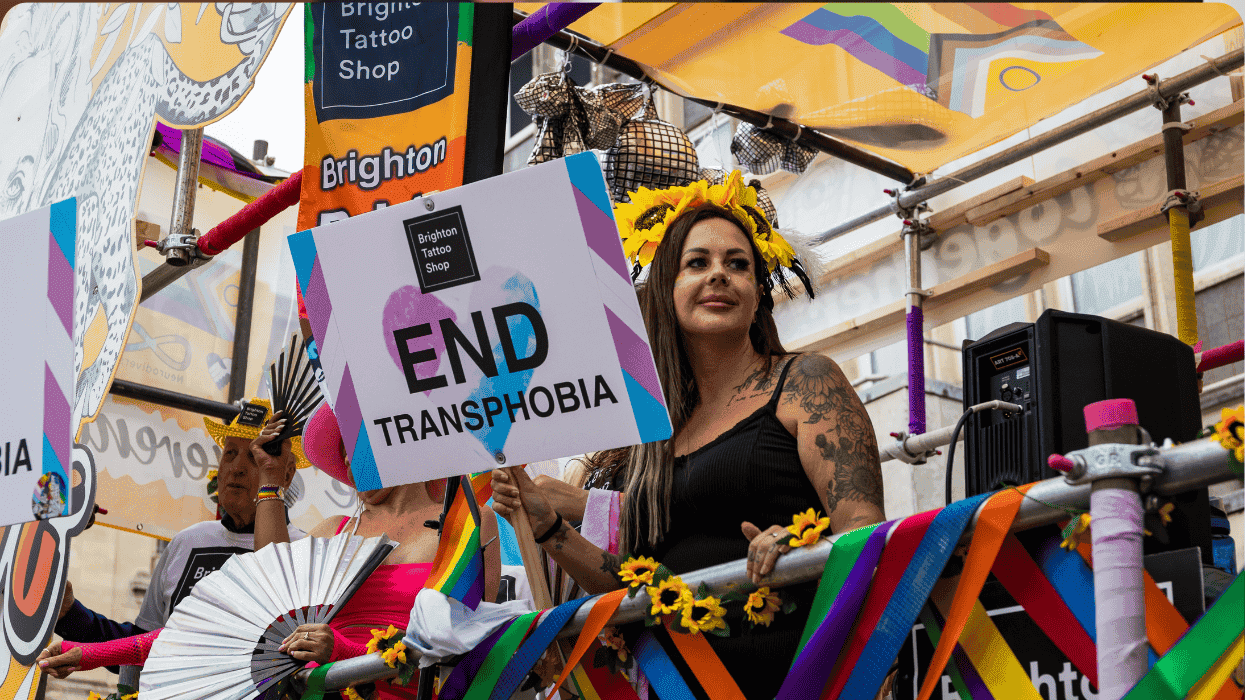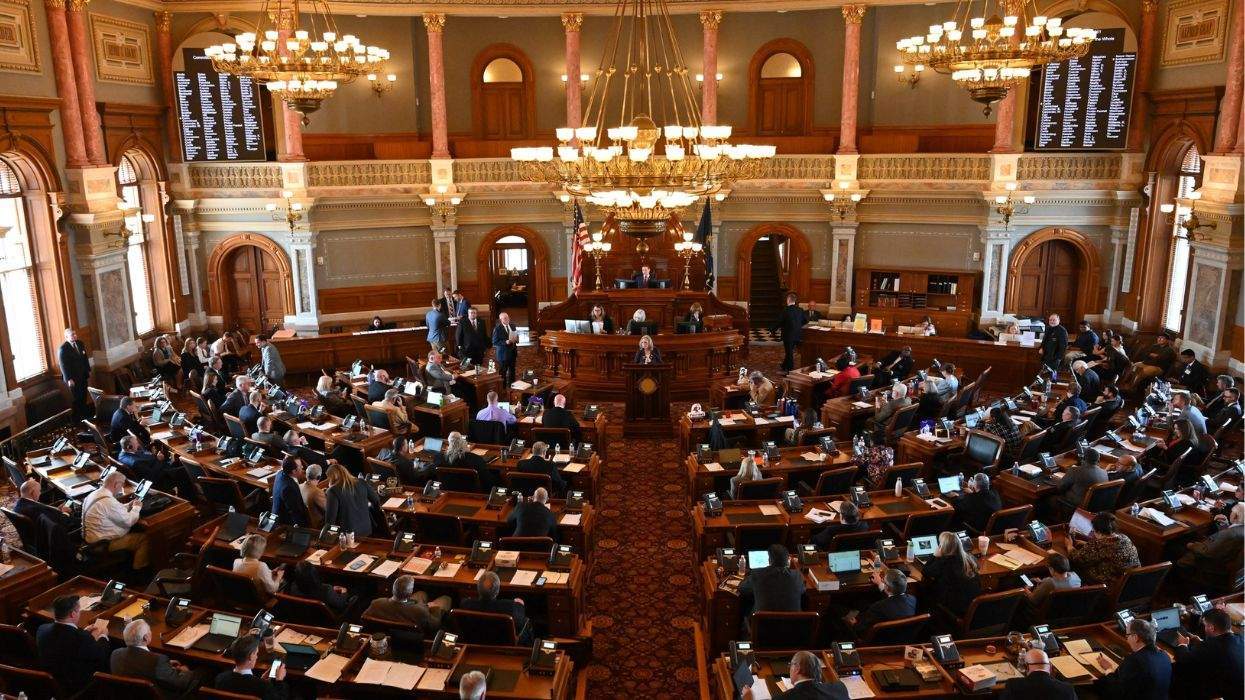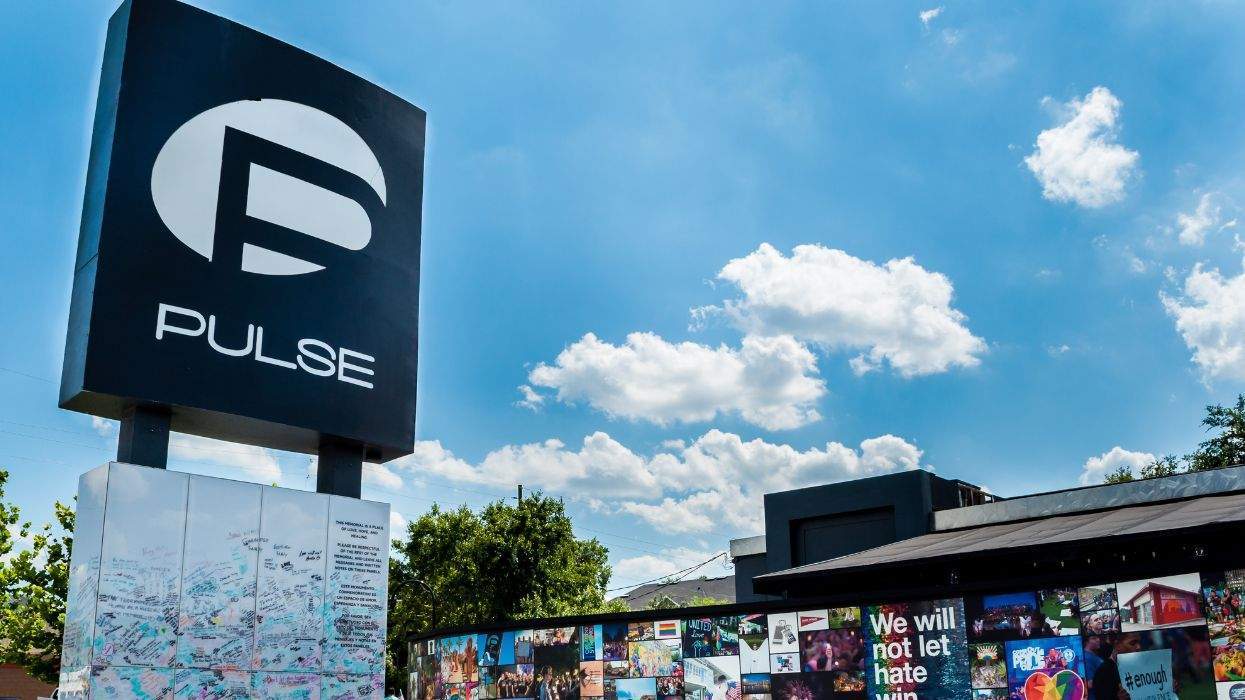A new documentary film looks at LGBT comics and demonstrates, as cartoonist Justin Hall says, that they "have provided a remarkable function for queer communities for the last several decades; they represent an underground and uncensored window into queer hopes, fears, and fantasies."
Hall's 2012 anthology No Straight Lines: Four Decades of Queer Comics was a Lambda Literary Award-winning and Eisner Award-nominated collection on the history of LGBT comics since the 1970s. He calls the book "my attempt to catalogue the contributions of a huge number of LGBTQ cartoonists and put their work into a historical and cultural context."
It's now serving as inspiration for the documentary No Straight Lines, directed and produced by Peabody Award-winning and Emmy-nominated filmmaker Vivian Kleiman, whose 2014 documentary Families Are Forever was about a Mormon family coming to terms with their gay son.
This exclusive clip from the film features Ed Luce, creator of Wuvable Oaf:
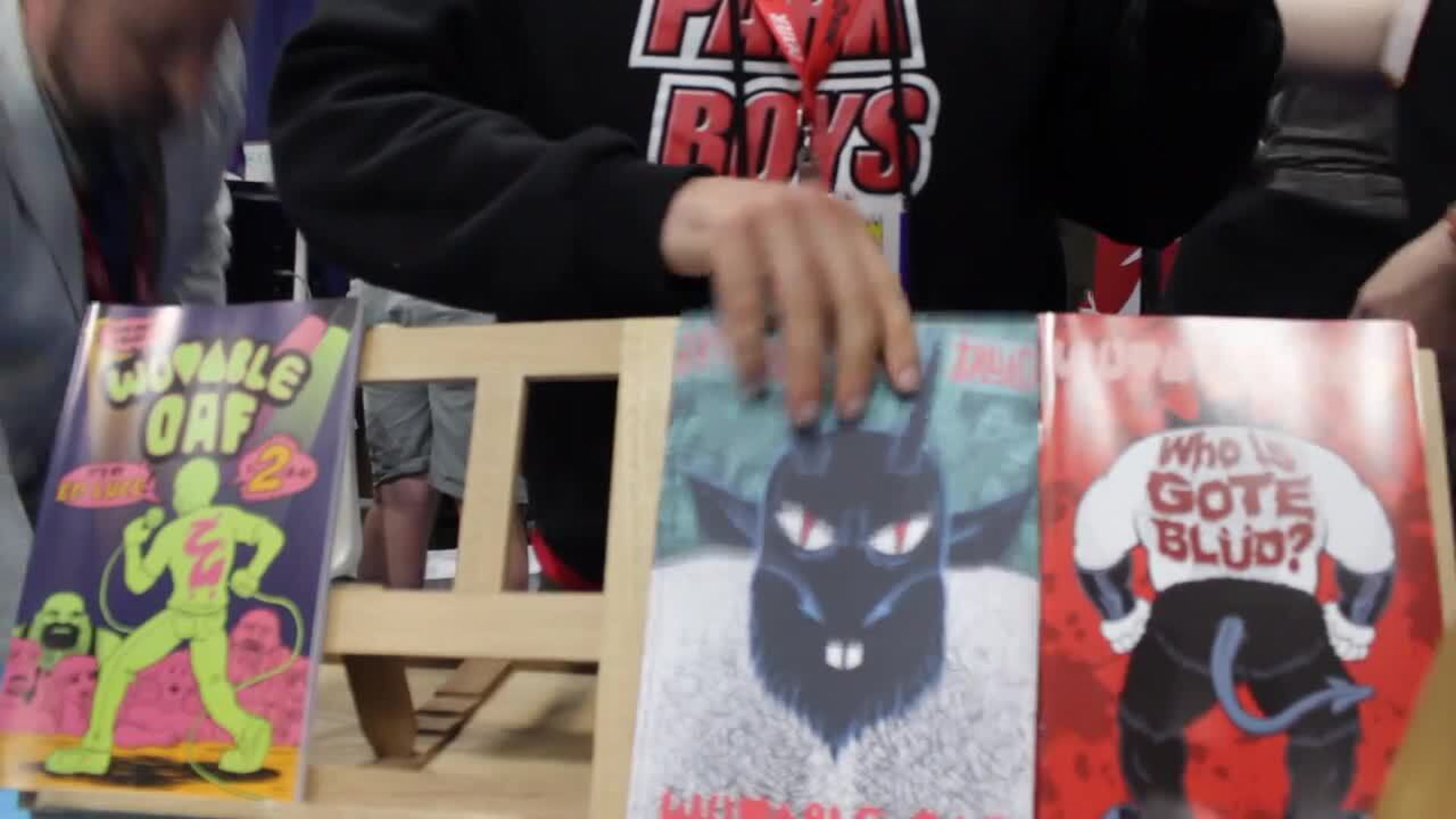
"Cinema has a different sort of power, particularly in evidence when a group of people comes to a theater to watch a moving story together," says Hall, reflecting on why he wanted to see the book translated to screen. "A good documentary film can shine a powerful spotlight on a subject, and that's what we're hoping for with No Straight Lines. ... We want this film to tell the story of LGBTQ cartooning, but also to capture the incredible personal journeys of the creators who have contributed to this dynamic artistic scene."
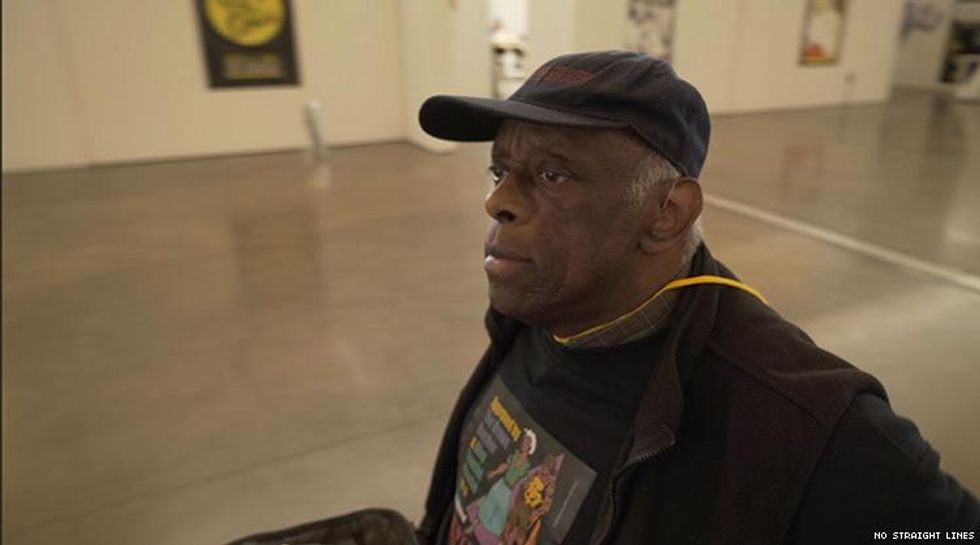
"These folks have been my artistic heroes for so long!" Hall says. "I've also known them all personally for years, but to really get up in their business with a camera and a set of probing questions is a very different sort of thing. Especially when it comes to a reclusive sort like Alison. Getting to film in her home in Vermont was a very special and intimate thing, and I think it comes out in the pretty remarkable footage we got with her. ... How wonderful to be able to film Howard at his kitchen table chatting with Dennis Kitchen about creating the Gay Comix series back in 1980, or to watch Alison inking a page of art as she describes the inspiration for Dykes to Watch Out For. ... There's this marvelous and powerful intimacy and sense of trust that comes from filming someone, and I feel like it's giving me an opportunity to get to know my friends and heroes that much better."
"We also have a number of other creators acting as a sort of Greek chorus of different LGBTQ cartoonist voices, and they represent a wide range of queer identities," says Hall. "Some highlights are Ajuan Mance, the creator of the series 1000 Portraits of Black Men, and a butch African-American professor and cartoonist who likens her work to stained glass; Emeric Kennard, a young trans man doing wonderfully expressive work; Nicole Georges, a Syrian-American lesbian memoir cartoonist -- Fetch, Calling Dr. Laura -- who never goes anywhere without her fabulous canine companion Ponyo; Jennifer Camper, a butch dyke Lebanese-American whose work deals with intersectionality with a fierce sense of humor; MariNaomi, a bisexual biracial cartoonist whose work, Becoming Japanese, Kiss and Tell, etc., explores both sexual and racial identity... [and] Dylan Edwards -- Transposes -- an ace trans man doing everything from memoir to high fantasy work. We'll be doing an epilogue of sorts with Scout Tran, a trans woman of color and Eisner-nominated web comics artist. She is also the creator of the artist-activist group the Degenderettes."
Hall, who teaches a comics history and cultural context class at the California College of the Arts, says, "Both LGBTQ history and comics history have been largely hidden enterprises. Just as queer stories are often left out of the history books, comics art has been traditionally dismissed by cultural and academic watchdogs."
He's found that there's simply no basic textbooks on the subject, although we're "now seeing critical studies and historiography done about comics in the same way that we've seen for painting, sculpture, novels, etc."
Unfortunately, Hall says, "Left out of even most of these new histories, however, is the story of LGBTQ comics, which existed in a sort of parallel universe to the rest of the comics industry. They were not available until recently in comic book stores, but rather published by queer publishers, serialized in queer newspapers, and sold in queer bookstores. Now that this insular LGBTQ media world has shrunk, cartoonists have had to either cross over into the mainstream -- something that is much more possible now -- or find new niche markets on the web. Our film is being created at the perfect crux moment where we can reflect on where we came from and to imagine an expansive queer future."
"Both the No Straight Lines book and film do what I think of as the same profound work," Hall says. "I remember the absolute last copy of the first print run of the book, which I sold at ComicCon in 2013; it was to a middle-aged straight woman buying it for her teenage gay son. She told me that she was getting the book for him because she wanted him to know his history and lineage, and she couldn't tell that story to him herself. She thanked me for creating the book for both of them and I promptly burst into tears. Then we hugged it out. It was an incredible moment. I want that mother and son to go to this film together as well when it comes out, to share some popcorn, laughter, and tears as that same history hits the big screen."
The team behind No Straight Lines has received grants from California Humanities, the San Francisco Foundation, and the Berkeley Film Foundation, and recently launched a Kickstarter campaign to raise an additional $38,000 to complete principal filming. After only a week, the team raised $15,000 in crowdfunding. Rewards being offered include signed graphic novels, original artwork, dinner with the film creators, and invites to private screenings.
